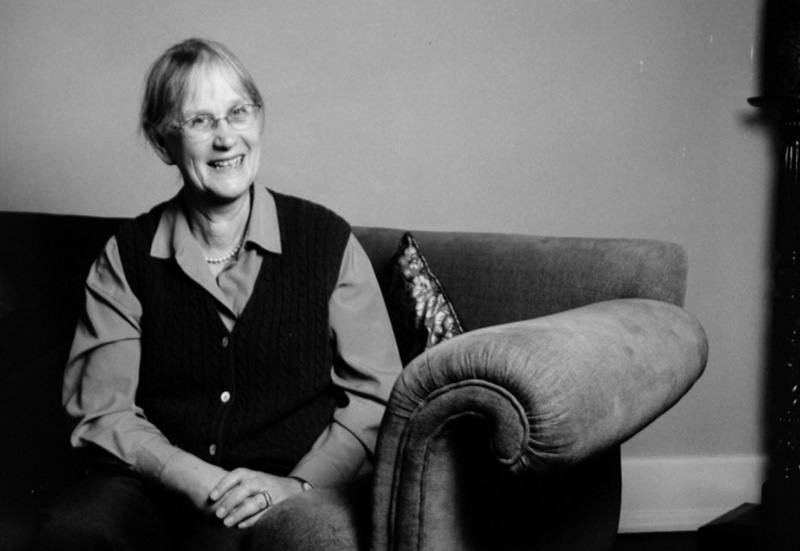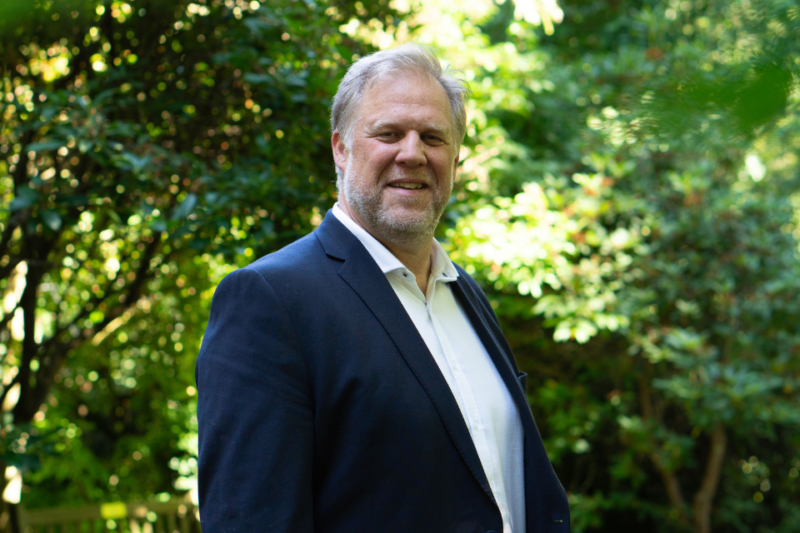Rector Trainor looks back at events of the 2023 Long Vacation
Writing as Freshers’ Week is in full swing, I’m glad to have the opportunity, as I begin my last academic year as Rector, to survey Exeter’s 2023 Long Vacation.
The most notable feature of the past three months has been the virtual completion of the Library Project. The books are moving back in, and the contractors are putting the finishing touches to the building. We are confident that the Library will reopen to students and other readers during the first week of the impending Michaelmas Term. Both inside and out, the improvement is spectacular. Yet the building is now closer – apart from the lift and modern heating and lighting! – to Gilbert Scott’s original design than at any time in the last hundred years or so. The ceremonial reopening of the Library will take place next May, by which time the west end of the Fellows’ Garden, and the Rector’s Garden, will have had time to recover from the side-effects of the project. In the interim there is ample opportunity for further donations, helping the College to avoid depleting reserves earmarked for important future projects. Many naming opportunities remain!

Books being returned to the Library
Meanwhile, during the summer the College once again hosted a number of conferences and a record attendance at the Exeter College Summer Programme. These activities reinforce the College’s academic connections and are, like regular donations from our alumni, crucial for the continued health of Exeter’s Income and Expenditure account.
Turning from the past to the future, there were three graduations ceremonies involving Exeter students during the summer months. The event in the Exeter Chapel – which follows the University ceremony in the Sheldonian – on 15 July was especially striking because all twelve of those graduating (half were clinical medical students and half were D.Phil.’s) could afterwards be called ‘doctor’! In addition, two were former presidents of the Middle Common Room. Also with regard to postgraduates, David Shaw (2019, DPhil Population Health) published a co-authored paper on invasive bacterial diseases during the Covid-19 pandemic in The Lancet, and Louise Downs (2021, DPhil Biomedical and Clinical Sciences) won the Lasker Foundation’s annual essay contest with an essay which is being published in the health-themed 2023 edition of Exon.
With regard to this autumn’s incoming UK undergraduates, preliminary analysis suggests that they are at least as diverse as recent cohorts. In September twenty arriving students attended the fifth annual residential transition course, Exeter Plus; to judge from the lively culminating dinner these students will make their mark on Exeter!
All of Exeter’s incoming undergraduates will be eligible to take advantage of the College’s new on-course support programme, led by graduate student study mentors working closely with tutorial fellows. The programme – which is scheduled to be extended to further years of study in subsequent years – will aim not only at easing initial transitions but also at promoting excellence.
Very sadly, in September Exeter lost an Emeritus Fellow, Professor Elizabeth Jeffreys (Byzantine and Modern Greek Studies), who held Oxford’s chair (which is attached to Exeter) in her field between 1996 and 2006; her well attended funeral was held in the College Chapel. Professor Jeffreys was especially devoted to Exeter which, unusually for a Statutory Professor, she served as Sub-Rector. Elizabeth and her husband Michael, also a distinguished scholar in the field, were enthusiastic members of the Exeter community, for example by celebrating their 50th wedding anniversary in the Rector’s Garden.

Elizabeth Jeffreys
A number of current Fellows, who had also served the College well, came to the end of their Fellowships during the summer: Dr Francis Bischoff (Mathematics), Dr Stephanie Cavanaugh (Spanish History), Prof Luciano Floridi (Ethics of Information), and Dr Natasha Simonova (English Literature). During the same period, fortunately, Exeter acquired a number of new Governing Body Fellows. Kerry Walker (Neuroscience), Associate Professor in Oxford’s Department of Physiology, Anatomy, and Genetics, is now our second tutorial Fellow in pre-clinical medicine; Dr Caroline Ritchie, a specialist in the literature of the Romantics, has become the Rankin Fellow in English Literature; Dr Chris Russell, a Fellow by Special Election, also holds an Associate Professorship in Artificial Intelligence, Government and Policy in the Oxford Internet Institute; and Prof Kejia Hu, also a Fellow by Special Election, has an Associate Professorship in Management Science at Oxford’s Said Business School.
There are also three incoming Supernumerary Fellows, academics who contribute to College life in various ways while remaining outside the Governing Body. They are: Sally Maitlis FBA (Professor of Organisational Behaviour and Leadership at the Said), Yang Shi FMedSci (Professor of Epigenetics at the Ludwig Cancer Research Group at Oxford’s Nuffield Department of Medicine), and Duncan Sparrow, an Associate Professor at Oxford’s Department of Physiology, Anatomy and Genetics where he and his group investigate how embryonic heart development can be perturbed by both genetic and environmental means.
The College is also welcoming this term many Visiting Fellows, who enrich the College’s academic and social life, drawn from a variety of subjects and institutions. The new Visiting Fellows are: Dr Hannah Bows (Law, University of Durham); Prof Brian Denton (Engineering, University of Michigan); Prof Tine de Moor (Management, Erasmus University Rotterdam); Prof Stuart Green (Law, Rutgers University); Prof Debora Marks (Biology, Harvard Medical School); John Pfumojena (Composer, Musician, Actor, and Director); Prof Kristen Poole (English, University of Delaware); & Dr Tim Sommer (English & Culture, University of Passau).
A number of Exeter’s long-term Fellows had notable summers. Neil Herring (Professor of Cardiovascular Medicine) and Giuseppe Marcocci (Professor of Early Modern Global History) won the University’s Recognition of Distinction, the equivalent of a full professorship. Courting India: England, Mughal India and the Origins of Empire (Bloomsbury) by Professor Nandini Das (English) was shortlisted for the British Academy’s Book Prize for Global Cultural Understanding. Also, as demonstrated at a late September launch event at Cohen Quad, Nandini’s project TRACTION (‘Teaching Race, Belonging, Empire and Migration’), funded by the European Research Council, is now to be disseminated through Oxford’s Department of Education. Meanwhile, Dr Paula Koelemeijer (Earth Sciences) produced a BBC video, ‘Three Minutes to the Centre of the Earth’.

Dr Paula Koelemeijer (Earth Sciences) produced a BBC video, ‘Three Minutes to the Centre of the Earth’
With respect to alumni, there was a major College trip in September involving Marguerite, myself and Development colleagues Yvonne Rainey and Adale Bennett. We held events, and met Exonians individually, in Vancouver (where Joyce Lee [1987, Jurisprudence] was our host), Seattle, San Francisco and Los Angeles (where Tim Marble [2012, MSc Software Engineering] hosted our event).
Then late September brought the Gaudy for those matriculating between 1979 and 1984. Every place was booked. After dinner Andy Anson (1983, Mathematics) regaled the gathered alumni with humorous tales of student (mis)adventures in the 1980s, to which he added an eloquent plea for improved facilities for sport at both the College and University levels. (Andy is advising Exeter on the College’s plans for the regeneration, jointly with Hertford, of the colleges’ adjoining sports grounds at Old Marston.) The evening was extremely lively – can the 2005-9 Gaudy scheduled for 22 June 2024 match this peak of sociability?

1979-1984 Gaudy
Summer 2023 has been a good one for the achievements of Exonians. Claire Coutinho (2004, Mathematics and Philosophy) became Exeter’s second ever Cabinet Minister when she was named Secretary of State for Energy Security and Net Zero. Neerav Patel (2002, PPE), who has been Director of the Joint Intelligence Organisation in the Cabinet Office, has been appointed UK Ambassador to Qatar with effect from February 2024. In addition, Jonathan Bengtson (1992, MPhil Modern History) has been made a Fellow of the Royal Society of Canada (RSC) Academy of Arts and Humanities. I also note that Janae Byrne (2018, Modern Languages) has co-founded a maternity clothing rental service in Berlin. The Long Vacation was also replete with alumni publications. In addition to those noted elsewhere in this edition of E-News, Ian Bunting (1954, Theology) has continued his exploration of Exeter’s religious history with an article, on the tumultuous later 16th and early 17th centuries, in Lucas: An Evangelical History Review (Series 3, no.1, June 2023).

Jonathan Bengtson (1992, MPhil Modern History) has been made a Fellow of the Royal Society of Canada (RSC) Academy of Arts and Humanities
Inevitably a number of our alumni die during each of the periods covered by the quarterly output of E-News. I note here, for example, the death of the distinguished scientist Dominic Kwiatkowski FRS FMedSci (1971, Psychology and Physiology), a Fellow of St John’s College Oxford. Dominic, who had held senior positions both at the Wellcome Sanger Institute and as Oxford’s Professor of Genomics and Global Health, gave a major well-received talk at Exeter a few years ago.
Dominic leaves a rich scientific legacy. His fellow alumnus J R R Tolkien (1911, English and Classics) famously bequeathed an imaginary world to future generations. During the coming term, marking the 50th anniversary of Tolkien’s death, Dr Stuart Lee, a member of the Exeter Senior Common Room, is organising a series of seminars at Cohen Quad on Tolkien’s work. Given the latter’s enduring popularity, this series should help to strengthen Exeter’s ties to its host city. Those links were also fostered in September when the College yet again welcomed many Oxford citizens during the annual Oxford Open Doors weekend.
Academic year 2023-24 promises to be an exciting time for Exeter. Watch this space for details as we continue to work on sustainability projects and other important issues while welcoming, for the 710th time, a new group of students to the College.
Rick Trainor
